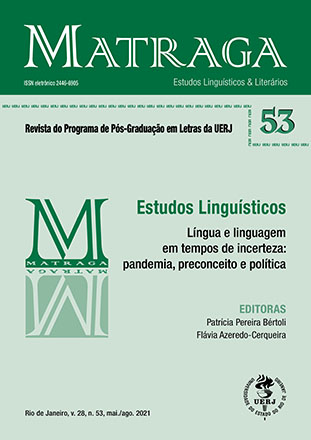Games-Based Learning: An experience report in teaching English during the pandemic
DOI:
https://doi.org/10.12957/matraga.2021.56312Keywords:
Teaching, Children, Role-playing games, COVID-19Abstract
COVID-19 has already taken over millions of lives and has brought the entire world to a halt. It has been a great challenge for teachers and students alike, especially for children. The area of education has reimagined itself. Children began to actively learn through the screens of their computers, tablets, and some, even cellphones. This article brings an experience report about strategies involving the principals and themes of Role-Playing Games used for online classes of English aimed at Brazilian children around the ages of five to nine years old. Role-playing games (at times also spelled as roleplaying games; abbreviated to RPG or RPGs) are games in which the people participating in them (players) assume the roles of characters within a fictional setting. The idea of using RPG strategies to retain the attention of children while teaching from afar, via Zoom, Skype or any other platform that allows the direct interaction between educator and student comes from RPGs’ incredible capacity of transporting the mind of children to a different space, a space of attention and entertainment. As perceived by Tolomei (2017) and also shown in this experience report, motivation and engagement are enhanced through game mechanics. The technique also fulfills the need for human relationships, which has been taken away by COVID-19.
Downloads
Downloads
Published
How to Cite
Issue
Section
License
Authorization
Matraga – Scientific Journal of the Post-graduate Program in Arts and Humanities of UERJ is authorized to publish the article submitted here, if it is accepted for online publication. It is attested that the contribution is original, that it is not being submitted to another publisher for publication, and that this statement is the expression of truth.
The works published in Matraga's virtual space – Scientific Journal of the Post-graduate Program in Arts and Humanities of UERJ will be automatically transferred, and your copyright is reserved to Matraga. Its reproduction, in whole or in part, is conditional on the citation of the authors and the data of the publication.

Matraga uses license Creative Commons - Attribution-Non-Commercial 4.0 International.





